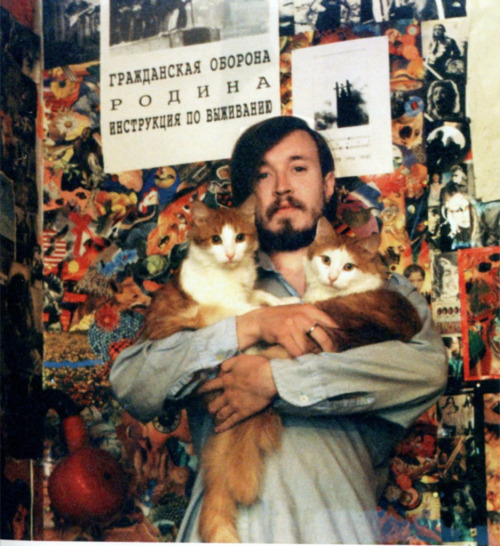Yegor Letov was extremely sickly in his youth, as a result of his family having moved from an area in Kazakhstan to where the soviet government would conduct nuclear explosions in the sky. Doctors told his family that he would not live past his teenage years, and Letov was indeed pronounced clinically dead multiple times until his health stabilised. As a result, Letov’s parents basically let him do as he pleased, resulting in his free spirit and anti-authoritarian views.
Grazhdanskaya Oborona formed in provincial Siberia as a two-piece between Letov and his long-time friend Konstantin Ryabinov. The band’s name a plays on both a nickname for the police and in its truncated form: ГрОб (Grob) the Russian word for coffin. They released two albums in 1985, with overtly political lyrics. This attracted the attention of the Komitet Gosudarstvennoy Bezopasnosti (KGB). For their trouble, Letov was interred at a psychiatric hospital while Ryabinov was conscripted into the army. In this forced exile; Letov began to write music prolifically.
In 1987, Letov would perform as Grazhdanskaya Oborona and under the deliberately controversial name “Адольф Гитлер” (Adolf Gitler). Stop right there, I know what this looks like, but Letov was an anarchist, and certainly not a Nazi. For instance, after a skinhead beat a non-Slavic fan of the band to death at one of the band’s concerts in 2004, Letov had very specific words for Nazi punks: “We are patriots but not Nazis … [to] totalitarians on the left and right and of all colours and stripes FUCK OFF. Please do not associate your stink with our activities.” Letov is and will remain an incredibly controversial figure in Russian culture, especially in light of his political advocacy in the early 90s.
The story goes that Letov was tipped off to the fact that that the KGB was going to arrest him again because of the Adolf Gitler performance, so he skipped town with his girlfriend and fellow punk Yanka Drevelia, a fellow musician. Letov hitched around the boondocks of the Soviet Union for a year, occasionally joined by friends and family, whilst disseminating bootlegged tapes and live recordings (known as magnitizdat), as well as playing live shows to earn bed and board. Letov returned home in 1988 after his family made appeals to the KGB. Between the years 1986 and 1990, the band released fifteen full-length albums, and that’s not even counting the various side-projects of various members of the band.
The music the band produced during the 80s is a strange blend of noise rock, anarcho-punk and Russian folk music. It is at once rough, angry and dirty ‘dangerous’ music that would make your parents weep, but also super-catchy, very poetic (even if you rely on translations). This music is incredibly aware of youth in general – especially their discontent with the Soviet Regime. In 1990 Letov broke up the band amidst fears that they would become a “commercial pseudo-counterculture project”, but eventually reformed in 1994 as a vaguely psychedelic shoegaze act. The general vibe of the music released after 1990 is brighter, feverish yet optimistic. It’s less political to be sure, but if the mission statement of their 80’s material was violence against the system, the mission statement of their post-80s material is peace. Grazhdanskaya Oborona continued to play sell-out shows right up until the death of Letov in 2008.
Words by Eamonn Kelly
This article first appeared in print volume 88 edition 1 HEAT.
https://www.youtube.com/watch?v=fqHpV2qhrkw&index=1&list=PLB7mP07T6lgFr5zXeYYQSyApMVuNyk99V

